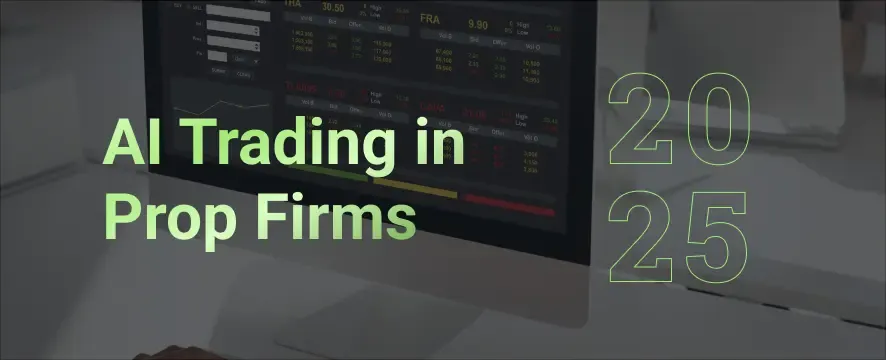
18 min read
Funded Trading Accounts Explained: Types, Benefits & How to Get One
A funded trading account gives you access to a firm’s capital to trade, share profits, and reduce personal risk.
13 min read
Share
Discover what a funded account is and how it can benefit UK traders in 2025. Get essential insights and tips to navigate your trading journey. Read more!

The foreign exchange market isn’t just big—it’s massive. Every day, over $5 trillion moves through forex trading. To put that into perspective, this amount dwarfs the combined GDP of several major economies.
With numbers like these, it’s no surprise more and more UK traders are shifting away from trading with their own money, and instead turning to funded trading programs as a serious, long-term way to grow their accounts.
In many respects, it makes complete sense. Many traders explore funded trading to reduce upfront capital requirements. However, it does come with strict rules and performance standards.
Think of it like this: the less capital you have, the more difficult it can be to trade effectively. The odds just aren’t in your favour. But with a funded account, you get to trade using a prop firm’s money and implement your trading strategy; meaning you don’t have to risk your own funds upfront (aside from the challenge fee).
So, what exactly is a funded account?
In simple terms, it’s an account where you trade using a proprietary trading firm’s capital - not your own. These funded trading accounts let you use the firm’s real or simulated capital while you follow their trading rules and risk management guidelines.
You are free to trade using your own strategy (within certain guidelines), and if you generate profits, you keep majority of the profit you make - often between 70% and 80%.
To clarify, the prop firm's capital is not a loan. There’s no interest to pay, no repayments, and no margin calls. Instead, you prove you have the skill and discipline to trade forex effectively, and then your trading account gets 'funded'.
Funded trading programs provide traders access to instant capital and profit-sharing arrangements, making them a great fit for forex traders who don’t have big personal accounts but have the ability to trade well and utilize various strategies.
Most of these programs use a two-step evaluation process - which we'll cover shortly. The basic idea is that you bring the skills, and the firm brings the capital. When you perform well and make money, both of you benefit.
These funded trader programs create a structured path for traders to go grow into a full-time career, or develop a viable side hustle. However, the trading firms lay down clear rules and usually offer ongoing support, including one on one coaching, designed to boost your chances of success.
Here’s the tough reality: most retail forex traders lose money. But it’s rarely because they lack knowledge or discipline. The main culprit is often undercapitalization - just not having enough money to trade with.
Trading with a small account, say £500, means even a 5% daily drawdown wipes out £25. That’s enough of a loss to really mess with your trading psychology. Trading with limited capital increases financial risk for many traders, and means even small losses hit hard and can trigger emotional attachment that leads to poor decisions, which is why many traders fail.
Funded accounts offer something different - access to accounts ranging from £10,000 up to £100,000 or more. Suddenly, strategies like swing trading, news trading, and various other trading styles become more practical. You'll be able to trade more effectively than if you were limited to a much smaller account.
More traders are asking this than ever before.
Funded trading removes one of the biggest barriers - access to serious capital. It lets skilled traders scale up without risking their own money. But it's definitely not a free ride!
The evaluation process is rigorous and the trading conditions are strict. Yet for those who make it, the potential profits are far greater than what’s possible trading with limited personal funds.
If you’re serious about growing as a trader, are structured in your approach, and patient with your progress, funded trading can be your ticket to start trading full time.
Most of the best prop firms offering funded accounts follow a similar approach. Here's how it typically works:
The journey to a funded trading account starts with an evaluation process. Here, traders must prove their skills by meeting specific profit targets in a simulated account or demo account environment. During this phase, you’ll need to follow strict trading rules - including risk management limits and daily drawdown caps - to show you can handle the financial risk responsibly.
Usually, there’s an upfront fee to enter the program or challenge. Successfully completing this evaluation unlocks access to a funded trading account with real capital. Account sizes vary depending on the program and the trader’s performance, often starting at £10,000 and sometimes going as high as £200,000 or more, contingent on your trading performance and account size.
This is your chance to prove you’ve got a trading edge. Typically, you need to hit a profit target between 8% and 12% within a set time limit - often 30 to 60 days, although Seacrest Funded has no minimum time limit.
Along the way, you must keep within strict daily drawdown limits and avoid breaking certain other trading rules, like holding positions over the weekend or exceeding loss limits. Managing risk well is essential during this phase.
Think of this as the firm’s way of double-checking. If you’ve demonstrated profitability, you now need to prove you can keep it consistent and disciplined. During this phase, the profit targets may be lower, but risk controls are usually tighter.
If you path both steps, you’re officially a funded trader. This is where profit sharing kicks in and you see the profits generated from your trading strategies . Depending on the program, you could be managing accounts with a value of £100,000 or even more, earning a profit split that rewards your success.
This two-step evaluation process ensures only the best traders gain access to funded accounts, helping prop firms maintain high success rates while offering traders a clear path to growing their trading capital and developing their trading career.
Technically, yes, anyone can join - but it may not always the best idea.
It's not that prop firms demand years of experience - it's more about your results (within their rules) than your trading history. But if you're new to forex - and the emotional struggle which can come with it, the evaluation phase could easily lead to overtrading or breaking the firm's risk management rules.
A better approach for beginners may be to focus on trading using a demo account to begin with. These risk-free environments, supplemented with training materials, are a good way to sharpen your trading skills, build consistency, and grow in confidence.
A lot of prop firms offer valuable trading materials such as guides, videos and webinars to help you grow your skill-set before attempting an evaluation challenge. If you're consistently profitable trading a demo account, then you may want to take a trading challenge.
Failing an evaluation isn’t the end of the world.
In fact, most traders don’t pass on their first try - and that’s perfectly normal. Many firms allow retakes, either for a fee or at a discount; you won’t be blacklisted or banned.
Failing can actually be a great learning opportunity. Each attempt will probably highlight areas where your discipline or strategy needs work, and helps you prepare for trading live capital under real pressure. Many prop firms also provide ongoing support to help you improve with each attempt.
With so many prop firms out there, choosing the right one can be overwhelming. Some trading platforms promise big rewards but enforce nearly impossible rules. The best programs strike a balance - offering conditions that work for traders, not against them.
Here's some key features to look out for:
Achievable evaluation targets - usually around 8–10% profit with 4–5% maximum drawdown
Structured account scaling - clear paths to increase your capital allocation as you prove consistency
Competitive fees - making the program affordable and accessible
Strategy flexibility - allowance for news trading and overnight holds if that’s your style
Low or refundable sign-up costs - makes it easier to get started
A broad range of forex pairs - especially GBP crosses for UK traders
Access to support, mentoring, and trading feedback - makes it easier to grow & develop
Every trader is unique, so the best prop firm depends on your style and needs.
Ask yourself:
Pick a firm that suits your trading style - not one that forces you to change your approach just to pass an evaluation.
Many traders falter during the evaluation by chasing profits too aggressively or ignoring rules. Here’s what firms really want to see:
Some firms (like Seacrest Funded) now offer unlimited-time evaluations.
Passing is less about luck and more about controlling risk. Keep these tips in mind:
Trading on a funded account comes with non-negotiable rules. These include profit targets, loss limits, and risk management requirements. Make sure your strategy aligns with these rules to avoid disqualification.
News Events: Major releases like Non-Farm Payroll (NFP) or Consumer Price Index (CPI) can cause rapid price swings. Some firms ban trading during these times; others, like Seacrest, allow it.
Weekend Positions: Most firms require you to close trades by Friday to avoid weekend gaps, which can affect swing traders. Some firms are more flexible if risk is managed carefully.
Automated Trading/EAs: Some prop firms allow bots or Expert Advisors; others don’t. Always check before building your strategy around automation.
Many programs clearly state their upfront fees, but watch out for hidden costs like:
Always read the fine print before committing.
One of the biggest advantages of funded trading is managing real-world sized accounts. You might start with £25,000, but consistent performance could allow you to trade £100,000 or more within months. Most firms offer scaling plans to increase your capital and profit share as you prove yourself.
However, bigger accounts shouldn’t change your discipline. Smart, steady risk management remains essential, no matter the size.
Demo accounts are great for practice, but they lack the pressure of trading real capital - even if it’s someone else’s money. Funded accounts introduce structure, rules, and consequences, which separate casual traders from professionals.
That psychological edge is what makes funded trading a true test.
UK traders should consider:
Additionally, look for firms with:
Drawdown limits keep your losses in check. For example, a 5% daily loss limit on a £50,000 account means a max daily loss of £2,500. Professionals usually risk far less per trade - often just 0.5% to 1%.
Think of it like a credit card limit: just because you can spend up to £2,500 doesn’t mean you should.
Scalping: Quick trades during high volatility - ideal for the London session, focusing on pairs like EUR/USD and GBP/USD.
Swing Trading: Holding positions for multiple days. Usually requires wider stops but potentially bigger gains.
News Trading: High risk/reward, only for firms that allow it. Take caution to manage positions carefully.
Brexit Impact: GBP volatility remains - stay cautious trading around major UK economic events.
Tax Implications: Profit payments may be taxed differently; consult an accountant.
Regulatory Transparency: Even if firms aren’t UK-based, ensure clear operations, fees, and data protection.
Looking to get started in funded forex trading? Here's a few basic tips:
Start with small challenges, focus on consistency, and use demo accounts to get familiar with rules. Prioritize process over profits early on. After passing your evaluation, you can trade funded capital and start building your funded trading career.
Remember, trading psychology is key. Staying calm and disciplined under pressure separates successful funded traders from the rest.
Funded accounts are powerful tools - but definitely not a magic solution. They reward discipline, patience, and skill - not shortcuts or desperation.
Lastly, understand the risks - financial and psychological, before committing. For those aiming to grow their trading business with limited personal capital, funded trading could be one of the smartest moves in 2025.
Funded accounts are becoming mainstream fast.
As the space continues growing, here's what to expect:
For UK traders aiming to turn pro, funded trading offers a viable path - one where capital is no longer the barrier, but discipline and skill open the door.
A major benefit is that you don’t need to commit large amounts of personal capital — but funded trading still involves evaluation costs, real pressure, and performance demands.

18 min read
A funded trading account gives you access to a firm’s capital to trade, share profits, and reduce personal risk.

12 min read
Yes, some prop firms allow news trading. This 2025 guide shows which firms permit it, their rules, and how traders can benefit.

10 min read
A funded trader uses a prop firm’s capital instead of their own. Learn how funded accounts work, profit splits, and how to qualify.

13 min read
To become a funded trader in 2025, you must pass prop firm challenges by mastering strategy, risk control, and trading rules.

9 min read
Discover effective AI trading strategies for prop firms to enhance your profits. Learn practical tips to navigate the market successfully. Read more!
Get an insight from other users about SeacrestFunded and their experiences. 131K+ members and counting

Get instant access to weekly newsletter.